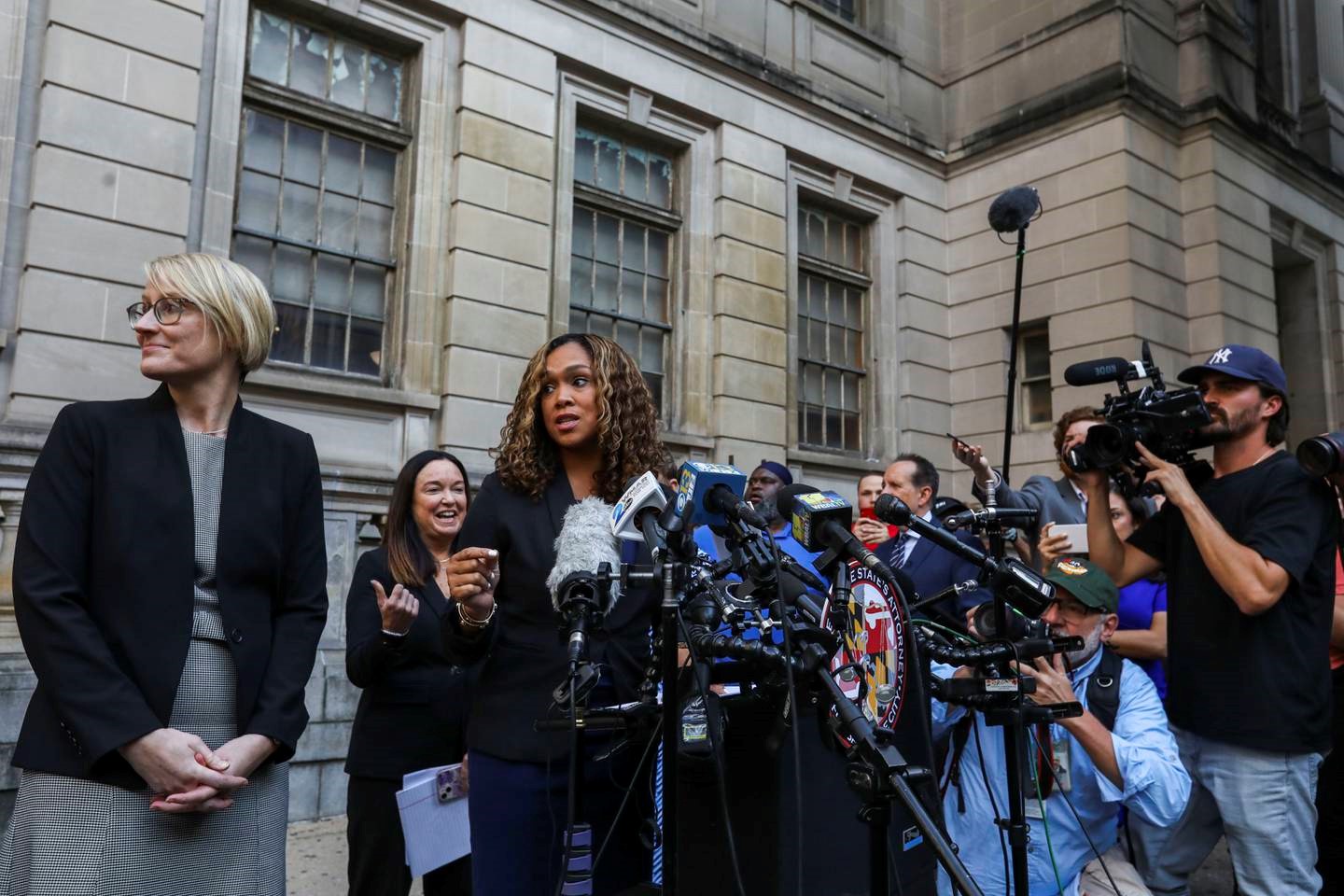
Hae Min Lee’s family deserves justice, not a distraction from Marilyn Mosby’s legal woes
Originally published in the Baltimore Banner
A court hearing on September 19, 2022 ended with the overturn of the conviction of prisoner Adnan Syed, who case was chronicled in the hit podcast ‘Serial’. Syed served more than twenty years in prison for the murder of his girlfriend, Hae Min Lee, in 1999. . ( Kaitlin Newman for The Baltimore Banner )
Editor’s note: This is one of three opinion pieces related to Adnan Syed and a judge’s decision to overturn his conviction. Read more here and here.
As throngs of podcast fans cheered the release of Adnan Syed, the family of 17-year-old murder victim Hae Min Lee cried. A judge agreed to the prosecution and defense’s joint motion to overturn Syed’s guilty conviction after his 23 years in prison.
Given only a weekend’s notice of the latest hearing, the Lee family is appealing the outcome, asserting that the judge denied them a meaningful opportunity to participate as mandated by the state’s victim’s rights law.
The rationale Baltimore’s chief prosecutor, Marilyn Mosby, gave for her decision in her news release, court filings and news conference was flimsy at best. What Mosby did offer the media and the public was a grand distraction from her own legal woes.
The timing of Mosby’s announcement prompted speculation. The same afternoon her office moved to free Syed, a federal judge set a date for Mosby’s own trial on perjury and fraud charges, for allegedly lying on COVID relief and mortgage applications.
Only two months before, Mosby lost her re-election bid, due to her failure to tackle crime and the multiple scandals dogging her. In the unlikely scenario that Syed is retried, the case will be foisted upon her successor (and political rival), Ivan Bates, putting him in an impossible position to try Syed with a deeply tainted jury pool.
After Lee disappeared in January 1999, her body was found a month later dumped in a local park. Police discovered that Syed, her ex-boyfriend, instilled fear in the victim and scribbled “I’m going to kill,” on the back of a breakup note from her. His handprint was found on a map in Lee’s car with the page torn out where her body was buried. Cell phone records indicated that Syed was in or near the park after the homicide. Syed said he was going to kill Lee, according to his friend who later said he helped Syed bury the body and led police to the victim’s missing car. Syed said he doesn’t remember when he hung out with his friend that day, where, what or when they did. But three separate witnesses placed Syed with that friend the night of the murder.
At his trial in 2000, a unanimous jury found Syed guilty of first-degree murder, kidnapping, false imprisonment and robbery. He was sentenced to life in prison plus 30 years.
Then in 2014, “Serial” podcast host Sarah Koenig combed the evidence of the case, weaving a convincing tale of Syed’s innocence across a dozen episodes – based largely on conjecture and extensive interviews with Syed himself.
But Syed’s appeals – including up to the US Supreme Court – all failed and for good reason. He blamed his first lawyer for “ineffective assistance of counsel” for not calling an alibi witness, Asia McClain, whose account actually contradicted Syed’s own version of events. Notably, Serial relies heavily on McClain to “prove” Syed’s innocence.
But after a hearing was granted, Syed’s new lawyer filed another motion in 2015, arguing that his trial lawyer ineffectively impeached the cell phone evidence and the prosecutors did not turn it all over to the defense – precisely the same claim Mosby and Syed’s defense are making now, except the court records show the lawyer did address that evidence and had access to all evidence used against Syed.
A city judge still ruled for a new trial in 2016 on the grounds that Syed’s defense counsel at trial was “ineffective” for not impeaching the cell phone evidence.
But Maryland Attorney General Brian Frosh rightly intervened. Frosh appealed to the state’s highest court, the Maryland Court of Appeals, which reversed the decision for a new trial because Syed did not offer evidence that exculpated him and because his lawyers were changing the reason for overturning the conviction from the alibi witness to the cell phone evidence.
Marilyn Mosby has been in office since 2015 yet has been oddly silent on the case.
To throw out Syed’s conviction, Mosby and Syed’s latest lawyer partnered up, offering the same old evidence dressed up as “new.”
The cell phone record data? As recently as 2016, the FBI’s chief cell phone expert independently verified the state’s original analysis.
The DNA? Mosby is re-testing evidence which already turned up no DNA whatsoever, pledging “[if] that DNA comes back inconclusive, I will certify that he’s innocent. If it comes back to two alternative suspects, I will certify that he’s innocent.”
For Mosby, if there is anything short of a ‘smoking gun’ proving Syed left DNA at the scene, he walks. But the absence of this evidence is not evidence of his innocence.
The Lee family deserves justice and to have the killer brought to justice – in a court by a jury under the laws of the state of Maryland, not in the court of public opinion by the whims of a disgraced and lame-duck prosecutor.
That’s not justice, it’s malice aforethought.
Sean Kennedy is a visiting fellow at the Maryland Public Policy Institute, focusing on crime and justice issues.






